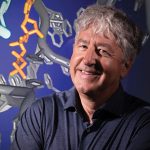When neurons involved in movement—called motor neurons—form, they must build connections that reach from the brain, brainstem, or spinal cord all the way to the toes. Now, Professor Samuel Pfaff, his team, and colleagues at the San Raffaele Scientific Institute in Italy provide a new understanding of how a “push-pull” relationship with blood vessels—in which growing neurons both attract blood vessels to them while also pushing them out of the way—guides the growth and development of motor neurons. Their discovery has implications for diseases in which motor neuron connections are destroyed, such as amyotrophic lateral sclerosis (ALS) or spinal muscular atrophy (SMA).
Read News ReleaseNeuroscience
The brain’s ability to perceive space expands like the universe
As we move about in our daily lives, we tend to think that we navigate space in a linear way—but our brain does not always act in a linear manner. Professor Tatyana Sharpee, graduate student Huanqiu Zhang, and colleagues discovered that time spent exploring an environment causes neural representations to grow in surprising ways. Neurons in the hippocampus, essential for spatial navigation, memory, and planning, represent space in a manner that conforms to a nonlinear hyperbolic geometry—a three-dimensional expanse that grows outward exponentially (like the interior of an expanding hourglass). This discovery provides valuable methods for analyzing data on neurocognitive disorders involving learning and memory, such as Alzheimer’s disease.
Read News ReleaseDeteriorating neurons are source of human brain inflammation in Alzheimer’s disease
Despite decades of research, Alzheimer’s disease remains a debilitating and eventually fatal dementia with no effective treatment options. Now, Professor Rusty Gage, graduate student Joseph Herdy, and colleagues have found that neurons from people with Alzheimer’s disease show deterioration and undergo a late-life stress process, called senescence. These neurons have a loss of functional activity, impaired metabolism, and increased brain inflammation. Additionally, the team discovered that targeting these deteriorating neurons with therapeutics could be an effective strategy for preventing or treating Alzheimer’s disease.
Read News ReleaseFeatured Stories
 Journey of a lifetime—The Cancer Center at Salk celebrates 50 years of life-changing discoveriesSalk’s Cancer Center has become a powerhouse of critical discoveries that have led to treatments and remissions for patients. The Center’s mission is to make current generations the last to see cancer as anything other than a routine diagnosis.
Journey of a lifetime—The Cancer Center at Salk celebrates 50 years of life-changing discoveriesSalk’s Cancer Center has become a powerhouse of critical discoveries that have led to treatments and remissions for patients. The Center’s mission is to make current generations the last to see cancer as anything other than a routine diagnosis.  Introducing Salk’s newest president, Gerald JoyceJoyce, a pioneer in the field of test-tube evolution, succeeds Professor Rusty Gage, who will return to his lab following a transformative leadership tenure. Joyce assumed the role April 21, 2023.
Introducing Salk’s newest president, Gerald JoyceJoyce, a pioneer in the field of test-tube evolution, succeeds Professor Rusty Gage, who will return to his lab following a transformative leadership tenure. Joyce assumed the role April 21, 2023.  Reuben Shaw—Unexpected resultsIt’s not every day a young scientist gets a jaw-dropping result he knows no one will believe. But that’s exactly what happened to Professor Reuben Shaw 20 years ago, in the spring of 2003.
Reuben Shaw—Unexpected resultsIt’s not every day a young scientist gets a jaw-dropping result he knows no one will believe. But that’s exactly what happened to Professor Reuben Shaw 20 years ago, in the spring of 2003.
 Tony Hunter—How an animal virus discovery more than 40 years ago led to one of today’s most successful cancer drugsThe story behind how Hunter discovered the first kinase that phosphorylates the amino acid tyrosine. The finding led to the development of Gleevec, a medication that is now routinely used to treat chronic myelogenous leukemia (CML).
Tony Hunter—How an animal virus discovery more than 40 years ago led to one of today’s most successful cancer drugsThe story behind how Hunter discovered the first kinase that phosphorylates the amino acid tyrosine. The finding led to the development of Gleevec, a medication that is now routinely used to treat chronic myelogenous leukemia (CML). Charles Stevens—A beautiful mind, and a heart to matchA pioneer in neuroscience, Distinguished Professor Emeritus Charles F. Stevens died peacefully on October 21, 2022, at his home in San Diego. He was 88.
Charles Stevens—A beautiful mind, and a heart to matchA pioneer in neuroscience, Distinguished Professor Emeritus Charles F. Stevens died peacefully on October 21, 2022, at his home in San Diego. He was 88. Leona Flores—Rocking cancer researchFlores had studied the design of the Salk Institute as an architectural engineering student, but never did she imagine that she would be the executive director of the Institute’s Cancer Center years later.
Leona Flores—Rocking cancer researchFlores had studied the design of the Salk Institute as an architectural engineering student, but never did she imagine that she would be the executive director of the Institute’s Cancer Center years later. Payel Mondal—Cancer researcher by day, financial planner by nightMondal is a postdoctoral researcher in Assistant Professor Christina Towers’ lab where she studies the mechanisms involved in cancer progression. Her hope is that her projects will someday be translated into therapeutics to help people.
Payel Mondal—Cancer researcher by day, financial planner by nightMondal is a postdoctoral researcher in Assistant Professor Christina Towers’ lab where she studies the mechanisms involved in cancer progression. Her hope is that her projects will someday be translated into therapeutics to help people. Salk receives $1.5 million from the Sol Goldman Charitable Trust and $1.25 million from The Jay and Sarah Flatley FoundationThe Salk Institute is grateful to its many generous supporters.
Salk receives $1.5 million from the Sol Goldman Charitable Trust and $1.25 million from The Jay and Sarah Flatley FoundationThe Salk Institute is grateful to its many generous supporters.
















































